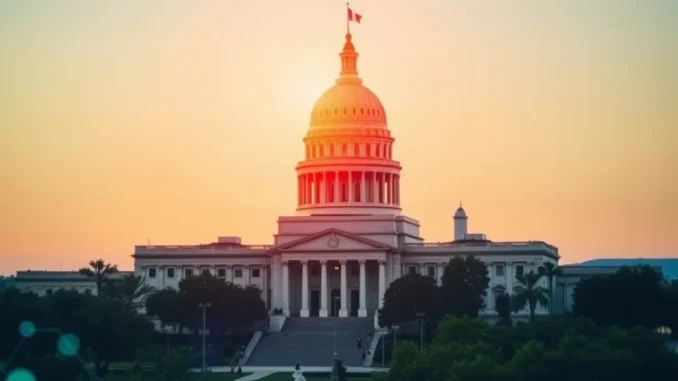
Exciting developments are unfolding in the Lone Star State! Texas is making significant strides in the world of digital assets, specifically with the recent progress of key legislation. The focus today is on the **Texas Bitcoin Bill**, a piece of legislation poised to potentially change how the state manages some of its assets.
What Happened with the Texas Bitcoin Bill (SB 21)?
The Texas Senate recently took a crucial step by adopting the Conference Committee report on the **Texas Bitcoin Bill**, known formally as **Texas SB 21**. This move wasn’t unanimous, passing with a vote of 24 to 7, according to reports from Bitcoin Laws on X. This vote signifies strong legislative support for the bill’s contents, bringing it one step closer to becoming law.
What does this adoption mean? It means the Senate has agreed on the final version of the bill after potential differences were resolved in a conference committee involving both the Senate and the House. The next, and arguably final, hurdle for **Texas SB 21** is getting the signature of the Texas Governor. Once signed, it officially becomes law.
Understanding the Strategic Bitcoin Reserve
One of the most groundbreaking aspects of **Texas SB 21** is its role as the legal foundation for the state’s planned **Strategic Bitcoin Reserve** (SBR). Think of the SBR as a strategic financial plan where the state intends to include Bitcoin as a reserve asset within its public finances.
Why would a state consider holding Bitcoin as a reserve asset? Governments and institutions typically hold reserve assets for stability, liquidity, and sometimes as a hedge against inflation or economic uncertainty. Including Bitcoin in this mix is a novel approach for a U.S. state, reflecting a growing recognition of cryptocurrency as a potentially valuable asset class. The **Strategic Bitcoin Reserve** aims to integrate this digital asset into the state’s long-term financial strategy.
Implications for Texas State Investment
Beyond just the reserve concept, **Texas SB 21** also explicitly authorizes the Texas state government to engage in **Texas State Investment** in Bitcoin. This is a significant authorization, allowing state funds to be potentially allocated towards purchasing and holding Bitcoin. The specifics of how this investment would be managed, the amounts involved, and the investment strategy would likely be determined by relevant state agencies under the framework provided by the bill.
This authorization for **Texas State Investment** opens up possibilities for Texas to gain exposure to the performance of Bitcoin, diversifying its portfolio beyond traditional assets like stocks, bonds, and fiat currency. It signals a forward-thinking approach to asset management, albeit one that comes with the inherent volatility associated with cryptocurrencies.
Why Texas Crypto Legislation Matters
The progress of **Texas Crypto Legislation**, particularly bills like SB 21, holds considerable weight due to Texas’s economic standing. Texas isn’t just any state; it boasts the second-largest economy in the United States, surpassed only by California. To put its economic power into perspective, if Texas were an independent country, its economy would rank as the eighth-largest globally. Given this scale, any significant financial or legislative move by Texas, such as establishing a **Strategic Bitcoin Reserve** or authorizing **Texas State Investment** in Bitcoin, can send ripples through the financial world and influence other states or even national discussions about digital assets.
The adoption of the **Texas Bitcoin Bill** by the Senate is a strong indicator of Texas’s ambition to be a leader in the digital asset space. Coupled with its existing reputation as a hub for Bitcoin mining and blockchain innovation, this legislative step reinforces Texas’s position as a key player in the future of finance and technology.
What Happens Next?
The fate of the **Texas Bitcoin Bill** now rests with the Governor. His signature is the final step required for **Texas SB 21** to become law. If signed, the focus will then shift to the implementation phase: how the **Strategic Bitcoin Reserve** will be established, the policies governing **Texas State Investment** in Bitcoin, and how these new initiatives will be integrated into the state’s financial operations. This is a critical moment for **Texas Crypto Legislation** and its impact on the state’s economic future.
Potential Benefits and Challenges
Moving into **Texas State Investment** in Bitcoin via the **Texas Bitcoin Bill** presents potential upsides and downsides:
- Potential Benefits: Diversification of state assets, potential for significant returns if Bitcoin appreciates, attracting further crypto business and talent to Texas, positioning Texas as a leader in financial innovation.
- Potential Challenges: Bitcoin’s price volatility could lead to significant fluctuations in asset value, security risks associated with holding digital assets, regulatory uncertainty at the federal level, public perception and political risks.
Actionable Insights
For anyone interested in the intersection of government finance and cryptocurrency, keeping a close watch on the Texas Governor’s decision regarding **Texas SB 21** is crucial. If signed, understanding the specific details of the **Strategic Bitcoin Reserve** and the framework for **Texas State Investment** will be key to assessing the practical implications of this landmark **Texas Crypto Legislation**.
Summary
The Texas Senate’s adoption of the Conference Committee report for the **Texas Bitcoin Bill** (SB 21) marks a significant milestone. This bill, now awaiting the Governor’s signature, is set to authorize **Texas State Investment** in Bitcoin and lay the groundwork for the state’s **Strategic Bitcoin Reserve**. Given Texas’s immense economic size, this piece of **Texas Crypto Legislation** has the potential to be a watershed moment, influencing both state-level asset management strategies and the broader perception and adoption of Bitcoin and cryptocurrencies in the United States.



